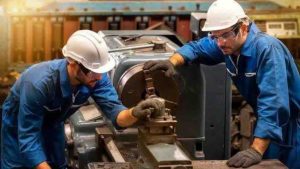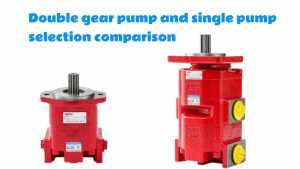Strengthening the maintenance and maintenance of hydraulic pumps is essential to extend the life of equipment, improve work efficiency and reduce failures. Especially gear pump and quantitative pump, widely used in industrial equipment, construction machinery, agricultural machinery, Marine equipment and automotive hydraulic system, its long-term efficient and stable operation requires scientific maintenance measures. The following will describe how to strengthen the maintenance and maintenance of the pump, and combine the requirements of high pressure, low pressure, large flow and other different working conditions.
Select the right pump type
In the daily maintenance of hydraulic system, choosing the right pump type is the key. For different applications, such as construction machinery, agricultural machinery or Marine equipment, the use of quantitative or variable displacement pumps depends on the requirements of the system for flow control and pressure control. Quantitative displacement gear pumps are suitable for constant flow scenarios and have high volumetric efficiency, while variable displacement pumps are suitable for scenarios that require flexible flow regulation, such as automation equipment and automotive hydraulic systems.
· Gear pumps are usually made of cast iron or aluminum alloy materials, which have good wear resistance and corrosion resistance, but in high pressure systems, it is necessary to ensure their high pressure sealing performance to avoid leakage. Therefore, choosing products with reliable quality and high brand reputation, such as Parker, JCB pumps, CASAPPA pumps, etc., can ensure efficient and stable operation.
Check the running status of the pump regularly
· In daily inspection, it is necessary to focus on monitoring the noise level of the pump. If the pump produces a state of low noise and smooth operation during operation, it indicates that the pump is in good working condition. On the contrary, if there is abnormal noise or vibration, it may be damaged or cavitation of the internal components, and timely maintenance is needed.
Ensure efficient heat dissipation and thermal management of the pump
In industrial equipment and construction machinery, the hydraulic system is often in high temperature working environment, then the thermal management of the pump is particularly important. The heat generated during the hydraulic energy conversion process needs to be dissipated in time, otherwise it will accelerate the aging of the oil and reduce the service life of the pump. Strengthening the heat dissipation system of the pump, such as installing a suitable oil cooler, can effectively reduce heat accumulation and avoid pump failure caused by high temperature.
·In the agricultural machinery and energy industries, the long-term high-load operation of pumps requires high thermal management capabilities to ensure efficient, long-life operation. Choosing pumps with high efficiency and good thermal management, such as PGP620 and PGP640 series gear pumps, can effectively improve the stability and durability of the system.
Replace hydraulic oil and filter regularly
Hydraulic oil is the core medium of hydraulic system, its quality directly affects the working efficiency of the system and the service life of the pump. Regularly check the quality of hydraulic oil to prevent impurities and moisture in the oil, which can effectively prevent the wear and corrosion of the pump. High quality hydraulic fluids reduce friction in the system and improve the volumetric and mechanical efficiency of the pump.
·At the same time, the cleaning and replacement of the filter is also a part that cannot be ignored. Impurities and contaminants in the hydraulic system can accelerate pump wear, and regular cleaning or replacement of filters can significantly extend the service life of the pump and reduce maintenance costs.
High pressure seal and leak protection
The high pressure seal of the hydraulic pump is very important for the stability of the system. Under high pressure working conditions, if the seal is poor, the hydraulic oil may leak, resulting in a decrease in the volumetric efficiency of the pump, and even affecting the performance of the entire hydraulic system. Therefore, in daily maintenance, it is necessary to regularly check the sealing parts of the pump, and select sealing materials that are resistant to high pressure and wear.
For example, in the mining equipment and wind power industries, high pressure sealing and leakage protection of pumps are particularly important. The use of industry standard certified seals, combined with regular maintenance, can effectively improve the safety and stability of the system.
Rely on the brand’s after-sales service and technical support
Choose brand reliable pumps, especially imported pumps, such as Parker hydraulic pumps, JCB pumps, Rexroth pumps, etc., usually can provide better after-sales service and technical support. Reliable after-sales service can provide timely technical solutions and spare parts supply to meet the customized needs of the system operation.
In the context of the global supply chain, hydraulic manufacturers not only provide cost-effective products, but also provide customers with customized hydraulic system designs to meet the specific needs of different industries, such as manufacturing, aerospace and heavy machinery in complex conditions.
Calibrate and adjust the control valve regularly
The control valve in hydraulic system directly affects the accuracy of flow control and pressure control. During long-term use, the control valve may be worn or stuck, resulting in unstable working conditions of the pump. Therefore, regular calibration and maintenance of the control valve to ensure its sensitivity and accuracy is essential to keep the pump operating with high precision.
· In construction machinery and automotive hydraulic systems, the high-precision adjustment of control valves can ensure the efficient operation of the hydraulic system. The use of reliable control valves, such as Parker, JCB and other brands, can improve the overall performance of the system.
 Hydraulic Pump products manufacturer | Rui Chen Hydraulic Machinery Co. Ltd
Hydraulic Pump products manufacturer | Rui Chen Hydraulic Machinery Co. Ltd





HelloPlease log in